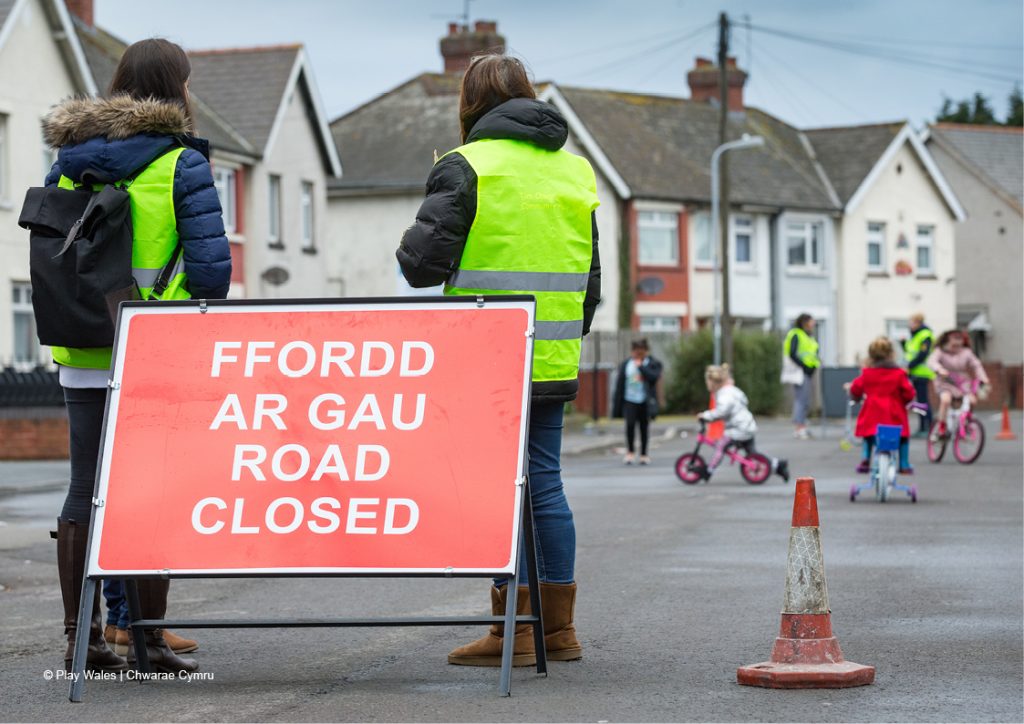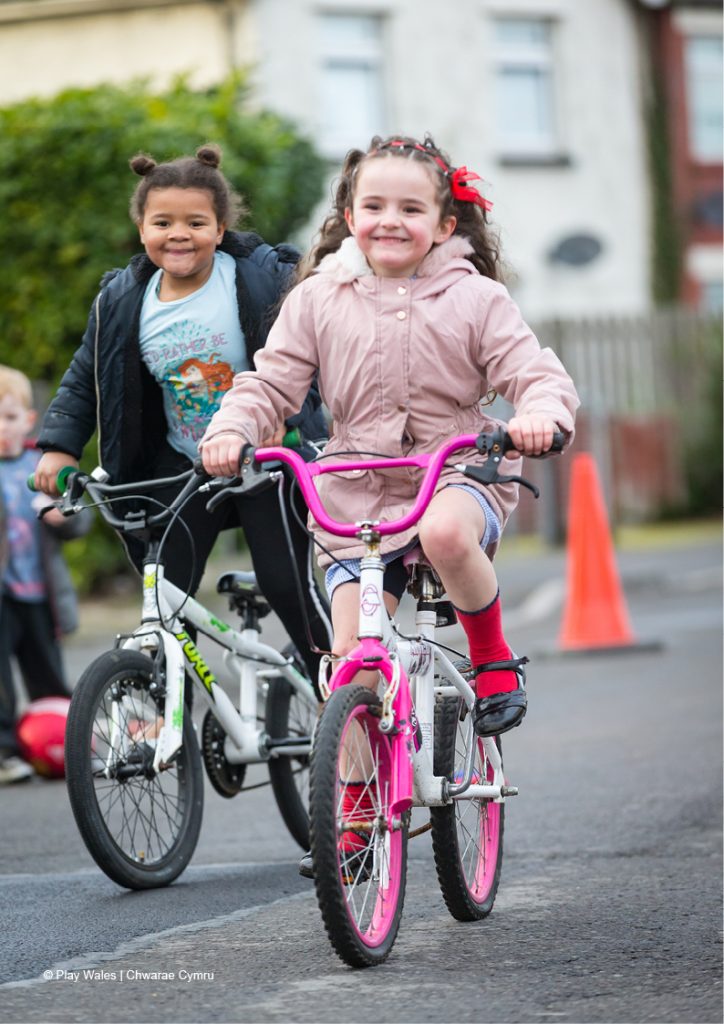Guest Author: Marianne Mannello, Assistant Director: Policy, Support and Advocacy for Play Wales
The Impact of the Car
Issues such as increased traffic and car use (moving and parked) are well-known barriers to children being able to play in their neighbourhoods. Children continue to raise concerns about the speed and volume of cars and traffic in their local neighbourhoods (Dallimore, 2019)

Having the freedom to just go out the front door and play near the street and close to home is no longer a normal part of most children’s lives, as it was just a few decades ago. The volume of traffic has increased over the years and the UK Government’s Department for Transport has predicted that it is likely to continue to rise between 17 and 51 per cent by 2050 (Department for Transport, 2018).
Such is the impact of the car on children’s play, that innovative and creative neighbourhood and community-based highways initiatives need to be encouraged and supported to raise awareness and foster positive solutions to local problems.
Hearts and Minds
Play Wales welcomes Welsh Government’s decision to adopt a 20mph national speed limit in all residential and built-up areas. This might just have the most wide-reaching and positive effect in supporting more children to play. It will slow traffic down, so reducing the risk of serious injury and improving the quality of air that children are exposed to.
To enable children to make the most of this policy change, there is a need to address the contemporary issues which have led to children’s inability to access play in their own neighbourhoods. Common trends include:
- changes in neighbourhoods, including increased car use, the speed of traffic and the more parked cars near homes
- parental restrictions due to fears of neighbourhood safety, traffic, and ‘stranger danger’
- increased intolerance towards children playing and meeting up
Some areas have addressed this by reclaiming streets for play through resident-led street play projects where roads are closed for short times often once a month, but sometimes once a day, to allow children to play. As well as helping children gain physical skills and social skills, there are plenty of good reasons to support play streets (Play Wales, no date).

Play streets operate as a parent and resident led initiative, based on the work of Playing Out (https://playingout.net) the national organisation that supports street play throughout the UK. It was set up over a decade ago by two parents frustrated by the impact that traffic was having on their children’s play. This idea has rolled out across the UK and internationally as easy way of helping children play near their homes.
A 2017 University of Bristol report suggests that supporting residents to temporarily close their streets for play could make a meaningful contribution to children’s physical activity levels. Children are three to five times more active during playing out sessions than they would be on a ‘normal’ day after school. The study also demonstrates that street play sessions increase children’s confidence in playing out and parents feel more comfortable in allowing this.
Opening Streets for Play in Wales
Cardiff is the first Welsh council to work towards global recognition as part of the Unicef Child Friendly City programme. As part of this, the council brought partners together to develop a Street Play project, joining nearly 70 other UK councils delivering similar schemes. The project streamlines the road closure application process to enable residents to close their street for short times to enable children to safely play close to their homes.
The council and Play Wales have worked with residents to make streets and communities friendlier places for children and teenagers to play. Facilitating street play sessions led by neighbours for neighbours – residents across the city are restricting the traffic on their streets for two hours a month for street play sessions.
Nine year old Jack wrote about his play street in the Play for Wales magazine (Play Wales, 2019). He explains why he thinks play streets are awesome:
‘Sometimes I go on my scooter or bike or when it’s wet, play football or other games. I don’t have a very big garden so playing on the road you have much more space. I have created new friends that I never knew and who I now know. They like some of my favourite things. My two younger sisters have had fun playing with their friends too. Also my sister has become more confident riding her bike because of play street. In addition, my sister has gained lots of friends from play street and she’s only two!’
Jack’s reflections are backed up by research by the University of Bristol on play streets which found that:
“another prevalent behaviour, which may promote increased physical activity and independent mobility beyond street play sessions, was development of cycling skills and confidence. This was observed in those children new to cycling (some as old as nine and ten years) who had not had the opportunity to learn how to cycle or were not confident enough to cycle unaided” (Play England, 2016)
Why Street Play is Important Now
As we emerge from some of the stricter elements of restrictions due to coronavirus, street play projects are a good fit to support community-based play when we begin to emerge from the lockdown and deal with the stress it has caused. Some of the advantages of play streets include:
- Play, particularly outdoor play, is essential for children during times of uncertainty to help them make sense of confusing times.
- Enabling children and their families to play and meet safely in line with physical distancing guidelines will support greater health and well-being for all.
- There is a general feeling that our streets were better places to be in lockdown – for safety, community cohesion and playfulness (such as chalked rainbows, teddy bear hunts, painted rocks).
- Older and vulnerable neighbours can take part either by acting as volunteer stewards or simply by watching from their own homes in doorways and front gardens.
- They are local and small outdoor gatherings which allow for supervising children from the home.
- They are low cost and easy models exist for councils in Wales to support.
And finally, children have a fundamental right to be able to play, and play is central to their enjoyment of a healthy and happy childhood. Providing opportunities for self-directed and self-determined playing supports children to be active participants in building their own resilience and resourcefulness.
With the uncertainty caused by the pandemic, opportunities to play are vital to help children make sense of their experiences, problem-solve, reconnect with their peers, and promote their own wellbeing. As we develop interventions and initiatives to support children emerging from the pandemic and its related restrictions, play is one of the most important areas of focus to promote children’s health and wellbeing.
Street Play Resources
Play Wales supports initiatives that reclaim the streets and neighbourhoods for children and teenagers to be able to play. To do this, we have worked with Playing Out to develop resources for residents, community organisations and local authorities in Wales.
How to organise playing out sessions on your street is a step-by step guide for residents organising street play sessions. It’s based on the experience of parents and residents across the UK. Additional supporting materials for parents to organise play sessions on their street are also available on our website.
Opening streets for play is a toolkit designed to provide clear and concise information about street play for local authorities and their partners. It’s intended to help local authorities to develop policies and procedures to enable resident-led street play projects in their areas. It is also useful for housing associations, school communities, community workers and local residents to understand the opportunities and challenges.
These toolkits address a range of common concerns and frequently asked questions, such as:
Why do children need to play in the street when there are parks nearby?
Parks are great for family outings and for older children who can get there independently but for younger children, it usually involves a special trip, organised and supervised by adults. Street play is very different. Firstly, it is literally on the doorstep so children can play ‘semi-supervised’ and can come and go independently. Secondly, children playing together on their street helps to build a sense of community and belonging, which in turn makes your street a safer and friendlier place.
Can I still have car access to my house?
Residents can still drive in and out during the session if they need to, just at walking speed to make it safe for everyone.
You may actually find it easier than normal to park on the street, since there will be no through traffic. For those not living on the street, it will usually only mean a tiny addition to journey times. Most sessions only last an hour or two and take place before rush hour and at weekends.
Why do you need to close the road? We just played out as kids
Times have changed. Streets are much more traffic dominated and it is no longer normal to see children out playing as it used to be. Having to organise an official road closure to use the street in this way is not a long-term solution. In some very quiet streets children can and do still play out naturally.
However, in many residential streets, cars – both parked and moving – dominate to such an extent that play becomes impossible. In this instance ‘playing out’ sessions provide a temporary solution and show what is possible. Ideally, our streets would be spaces where cars and people of all ages can coexist happily.
Won’t it encourage children to think the road is a safe place to play under normal circumstances?
We have had many conversations with parents about this and there is a strong agreement that even young children can understand the difference between a playing out session and normal circumstances. There should be a clear signal that the road is ‘safe to play’ and parents will ensure children understand that things are ‘back to normal’ once the session is over. Play street sessions are also a good opportunity for parents to talk to their children about road safety and the danger of traffic.
For advice and information about kickstarting street play in your area, get in touch with Play Wales.
In the spirit of academic peer review, THINK welcome referenced response blogs to encourage open discussion. If you would like to write a response blog please email think@aber.ac.uk with the subject line 'Blog Response'
References
Dallimore, D., 2019, ‘I learn new things and climb trees’. What children say about play in Wales. Analysis of 2018/19 children’s surveys. For Play Wales November 2016. Online. Accessed 20th October 2022. https://www.playwales.org.uk/login/uploaded/publications/PSA%20children’s%20report%20.pdf
Department for Transport, 2018 Road Traffic Forecasts 2018. Moving Britain Ahead. July 2018. Online. Accessed 20 October 2022. https://assets.publishing.service.gov.uk/government/uploads/system/uploads/attachment_data/file/873929/road-traffic-forecasts-2018-document.pdf
Play England, 2016. Why temporary street closures for play make sense for public health. Online. Accessed 20th October 2022. https://playingout.net/wp-content/uploads/2021/10/Play-England_Why-temporary-street-closures-make-sense-for-public-health.pdf
Playing Out, no date. Online. Accessed 20 October 2022. https://playingout.net/nearby-you/an-international-movement/
Play Wales, no date. Online. Accessed 20 October 2022. https://www.playwales.org.uk/login/uploaded/documents/Publications/Street%20play/10%20good%20reasons%20for%20street%20play.pdf
Play Wales, 2019. Play for Wales Magazine. Winter 2019, Page 9. Online. Accessed 20th October 2022. https://www.playwales.org.uk/login/uploaded/documents/MAGAZINE/Play%20for%20Wales%20issue%2054.pdf
Play Wales, 2022. Accessed 20th October 2022. Online. https://www.playwales.org.uk/eng/rightoplay